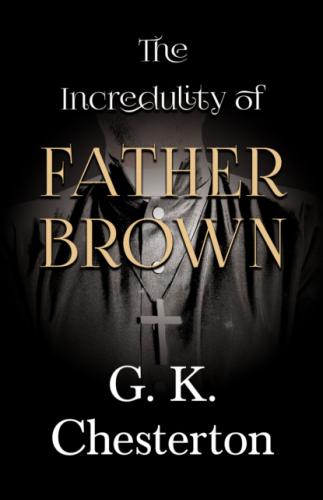THE
INCREDULITY OF
FATHER BROWN
By
G. K. CHESTERTON
First published in 1926
Copyright © 2020 Read & Co. Classics
This edition is published by Read & Co. Classics,
an imprint of Read & Co.
This book is copyright and may not be reproduced or copied in any
way without the express permission of the publisher in writing.
British Library Cataloguing-in-Publication Data
A catalogue record for this book is available
from the British Library.
Read & Co. is part of Read Books Ltd.
For more information visit
Contents
I THE RESURRECTION OF FATHER BROWN
IV THE MIRACLE OF MOON CRESCENT
V THE CURSE OF THE GOLDEN CROSS
G. K. Chesterton
Gilbert Keith Chesterton was an English journalist and author, who came of a family of estate-agents. He was born in London on the 29th of May 1874.
He was educated at St Paul’s school, which he left in 1891 with the idea of studying art. But his natural bent was literary, and he devoted himself mainly to cultivating that means of expression, both in prose and verse; he did occasional reviewing, and had some experience in a publisher’s office.
In 1900, having already produced a volume of clever poems, The Wild Knight, he definitely took to journalism as a career, and became a regular contributor of signed articles to the Liberal journals, the Speaker and Daily News.
He established himself from the first as a writer with a distinct personality, combative to a swashbuckling degree, unconventional and dogmatic; and the republication of much of his work in a series of volumes (e.g. Twelve Types, Heretics, Orthodoxy), characterized by much acuteness of criticism, a pungent style, and the capacity of laying down the law with unflagging impetuosity and humour, enhanced his reputation.
His powers as a writer are best shown in his studies of Browning (in the “English Men of Letters” series) and of Dickens; but these were only rather more ambitious essays among a medley of characteristic utterances, ranging from fiction (including The Napoleon of Notting-hill) to fugitive verse, and from artistic criticism to discussions of ethics and religion.
— A Biography from
1911, Encyclopædia Britannica, Volume 6
The Incredulity
of Father Brown
I
THE RESURRECTION OF FATHER BROWN
THERE was a brief period during which Father Brown enjoyed, or rather did not enjoy, something like fame. He was a nine days' wonder in the newspapers; he was even a common topic of controversy in the weekly reviews; his exploits were narrated eagerly and inaccurately in any number of clubs and drawing-rooms, especially in America. Incongruous and indeed incredible as it may seem to any one who knew him, his adventures as a detective were even made the subject of short stories appearing in magazines.
Strangely enough, this wandering limelight struck him in the most obscure, or at least the most remote, of his many places of residence. He had been sent out to officiate, as something between a missionary and a parish priest, in one of those sections of the northern coast of South America, where strips of country still cling insecurely to European powers, or are continually threatening to become independent republics, under the gigantic shadow of President Monroe. The population was red and brown with pink spots; that is, it was Spanish-American, and largely Spanish-American-Indian, but there was a considerable and increasing infiltration of Americans of the northern sort—Englishmen, Germans, and the rest. And the trouble seems to have begun when one of these visitors, very recently landed and very much annoyed at having lost one of his bags, approached the first building of which he came in sight—which happened to be the mission-house and chapel attached to it, in front of which ran a long veranda and a long row of stakes, up which were trained the black twisted vines, their square leaves red with autumn. Behind them, also in a row, a number of human beings sat almost as rigid as the stakes, and coloured in some fashion like the vines. For while their broad-brimmed hats were as black as their unblinking eyes, the complexions of many of them might have been made out of the dark red timber of those transatlantic forests. Many of them were smoking very long, thin black cigars; and in all that group the smoke was almost the only moving thing. The visitor would probably have described them as natives, though some of them were very proud of Spanish blood. But he was not one to draw any fine distinction between Spaniards and Red Indians, being rather disposed to dismiss people from the scene when once he had convicted them of being native to it.
He was a newspaper man from Kansas City, a lean, light-haired man with what Meredith called an adventurous nose; one could almost fancy it found its way by feeling its way and moved like the proboscis of an ant-eater. His name was Snaith, and his parents, after some obscure meditation, had called him Saul, a fact which he had the good feeling to conceal as far as possible. Indeed, he had ultimately compromised by calling himself Paul, though by no means for the same reason that had affected the Apostle of the Gentiles. On the contrary, so far as he had any views on such things, the name of the persecutor would have been more appropriate; for he regarded organized religion with the conventional contempt which can be learnt more easily from Ingersoll than from Voltaire. And this was, as it happened, the not very important side of his character which he turned towards the mission-station and the groups in front of the veranda. Something in their shameless repose
